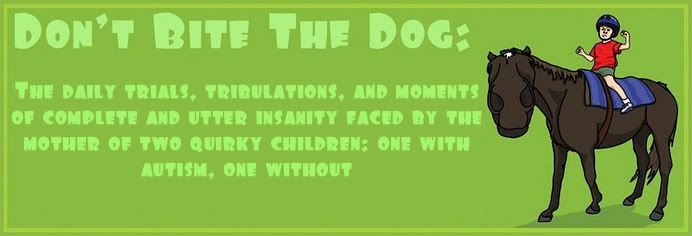So I had to write a definition essay for my English class... And it occurred to me that this would make an excellent blog post. Because, you know, I never ever use my papers as cop-out posts, now do I? Bwahahahaha. Anyway, enjoy. Don't tell me it sucks, because that will bruise my fragile ego and you'll reduce me to a sniffling, Pixie Stick devouring fool.
When the Definition Just Doesn’t Cut It
If you look up the noun “advocate” in an online dictionary, the first definition to pop up on your screen is “one that pleads the cause of another.” While it is a succinct, accurate definition, it fails to convey the emotion and dedication that lives in the heart of any parent who advocates for their special needs child. A true advocate does so much more than plead the cause. The cause is the air we breathe, the life we lead, and the ambition that fuels our devotion to our children.
One is not born an advocate. It is something that develops over time, a slow and laborious process. It begins with the obvious: the cause. In this case, a special needs child. As new parents, we look at our children with wonder and joy, never thinking about the hurdles they might encounter later in life. They’re perfect, and we’re hopeless. We’ve never done the parenting thing before, and we’re scared and inexperienced. We make mistakes, we learn from them, and we begin to build a foundation of knowledge. Sooner or later the day comes when we are presented with our challenge, be it a diagnosis of Down syndrome, autism, blindness, deafness, ADHD, cerebral palsy. We’re unprepared, even if we think we have it all figured out. We travel down the long road of medical visits, psychological evaluations, IEP meetings, therapy sessions. Again and again, we meet resistance that stands between our children and their best interests, and sometimes we compromise where we should have stood firm. Sometimes we stand firm where we should have compromised. Sometimes we pick really stupid things to make a fuss over, like whether they should be allowed to chew straws at school. Then we step back, re-evaluate, and try again and again until we get it right. We never really get it perfectly, but we keep trying anyway.
As advocates, we fight our own personality flaws. We step outside of our minds for a time, and overcome the things that would hold us back. When we walk into the school for an IEP meeting, we are confident and assertive, even when in our heads we’re terrified and uncomfortable beyond belief. We try not to show weakness, because if we do, then we run the risk of not being taken seriously by that room full of professionals with years of experience and walls covered in diplomas. So often, we’re “just parents” and we have to fight to be treated as equals in a society that doles out respect based on the letters that appear after one’s last name.
Advocates don’t give up. We accept that we won’t always get what we feel our kids need, and we compromise where we have to, but we never stop striving for the best. We don’t wallow in self pity or humiliation after a sound verbal trouncing during a meeting with a school district bigwig, instead we reflect on what could have been said to avoid that situation and learn from it. We develop thick skin and accept that there will always be people who disagree or who flat out do not care, and we realize that there is no place for hurt feelings and bruised egos if we are to help our kids achieve their goals.
An advocate never stops learning. We research everything from diets to alternative treatments. We learn about our children’s schools, their teachers, their therapists. We strive to stay informed and in regular communication with every professional in our children’s lives. We write emails, scribble notes on ripped pieces of notebook paper, leave messages with the endlessly patient front office secretary. We spend hours poring over IEPs, progress reports, therapy notes, and assessments. We learn crazy terms like “proprioception” (the awareness of movement, an important factor where autistic kids are concerned) and write out the word “otolaryngology” so many times that we no longer need spell check to get it right.
We are not infallible. We’re human. Sometimes we put our feet firmly into our mouths, sometimes we act like idiots. Sometimes we have no clue what we’re talking about. Sometimes we’re cold and demanding, or we’re meek and lacking in any kind of confidence. Sometimes we feel terribly guilty for making waves, or for getting school staff into trouble, even though we’re only asking for what the law promises our little ones. Sometimes we get mad, and wish we could strangle somebody. Some of us have been known to go so far as to cuss out a tactless physician or teacher. Sometimes we go to a meeting totally unprepared, and sometimes we’re too nervous to read the list of things we want to discuss at that meeting. Sometimes we really wish we could just sit back and be happy and nice to everyone, and hope that things will just fall into place and that everything will work itself out.
So yes, an advocate is someone that pleads the cause of another. But more than that, an advocate is someone who is devoted to their cause, who lives it and breathes it and never stops trying. You just can’t put all those things into one little definition.
And for the record, this "we" I used is not me. I'm a piss poor advocate right now. I'm in those learning stages, I'll get better. But I suck right now. That's why I lean on the wonderful folks of the ECAC for advice, support, and ideas. The "we" in that essay are the parents I'm fortunate to be friends with and the professionals who make advocating for kids with disabilities their life's work, those who generously share their knowledge and experience with me.
The Telepathy Tapes, Part Deux
2 days ago








2 comments:
Hi! New commenter! Don't worry, an English paper is never a cop-out. I should know, I'm an english major. I think the ideas you present in this one are really clear and well-versed, but I must ask: is your paper supposed to be in MLA format? If so, watch your use of pronouns like "we" "I" and "you" in regards to papers based around definition. In MLA you can lose quite a few marks that way.
Hi Alice ( :
Honestly I'm not sure on your question. She likes papers to be MLA format as far as the actual layout and spacing and all that, but she's never taken off points for using I or we (because I always seem to writw that way). On this assignment, we had a choice of doing a formal or informal definition paper, so I went with the informal. Some of the examples in the book were similar to mine, so I figured it would be ok. But honestly, I'm not really sure. I don't quite "get" the MLA stuff yet though.
Post a Comment